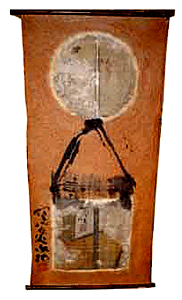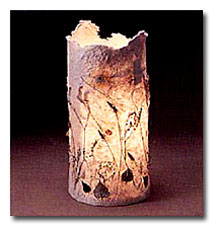Creating Products that Sell Well: People with Intellectual Disabilities Creating Artistic Works for Sale (August.2002)
A number of artistic works created by people with intellectual disabilities are now selling like hot cakes at major department stores. The products are handmade works made of Japanese traditional paper in which various plants of the seasons are dynamically arranged. These products are not sold as special works created by people with intellectual disabilities. They sell well because their genuine artistic value is highly recognized.
"To create products that sell well." That is why Choryusui Okuno and Machiko Ohno established a papermaking studio called "Sky and Sea". Their clearly business-oriented way of thinking may be too direct to be adopted by other workshops for people with disabilities in Japan. However, the buyers looking for something that customers would love to purchase, are greatly impressed by the artistic works created earnestly by the people with intellectual disabilities at "Sky and Sea". Every year sales exhibitions are held at department stores throughout Japan.
At department stores, it is never mentioned that people with intellectual disabilities created the products. Customers buy the products simply because they like them. In 1996, when the Shinjuku branch of Takashimaya Department Store was opened, a major sales exhibition of works created by "Sky and Sea" was held. The sales exhibition took place during the May "Golden Week" holiday period and attracted a very large number of people and made record sales. Every year sales exhibitions are held at department stores around Tokyo and other parts of Japan.

This tremendous success can be attributed to the sincere efforts made by Okuno and Ohno, the two artists who established "Sky and Sea". After graduating from high school, Mr. Okuno trained to become a Buddhist monk for four years at a well-known temple located on Mt. Koya in Wakayama Prefecture. During this time he also diligently studied Japanese calligraphy.
Later while Mr. Okuno was working as a high school teacher, he learned the Asian art of papermaking. At that time, he was also greatly impressed by an essay written by a person who studied in the United Kingdom concerning how to teach swimming to people with disabilities.
About 20 years ago, Mr. Okuno began to teach swimming to disabled people at a swimming school in Tokyo. Ms. Ohno, was also teaching swimming to the disabled at the same swimming school and together they became responsible for a swimming class for the disabled. Ms. Ohno is a painter and a color coordinator by profession.
It was at that time that the parents of their students complained to them that people with intellectual disabilities did not have places to go after finishing school. They then started their work on creating a facility for people with disabilities. They persisted through a process of trial and error for about 10 years making full use of their talents and experiences as artists. Finally, they successfully established the papermaking studio called, "Sky and Sea".
At present, 24 people aged from 15 to 38 with intellectual disabilities are working for and studying at the studio. Their parents made a desperate effort to find them a place to go after finishing school. Their parents earnestly hoped that their children would learn some skills to enable them to make their own living and to make their lives more worthwhile.
One family actually visited welfare facilities all over Japan and finally decided to choose "Sky and Sea". They even moved to a nearby place so that their child could attend the studio. Now in total there are three workshops and a showroom, which are operated with the cooperation of four full-time and two part-time staff, parents and about 20 volunteers living nearby. A web site has also been established by one of the parents who is skilled at Web designing.
In the process of creating, one person is in charge of one work. In order to make an excellent product, each person finishes his or her own part perfectly with responsibility. They use paper mulberry, bought from Thailand and Ogawa Village in Chichibu, as material. They spread, by hands, paper mulberry fiber very thinly in a wooden frame sunk in a water tank. Then they mix nuts, berries, fruits or flowers of the seasons that they get in mountains into the raw paper, dry it in the sun and produce tapestries, lampshades, coasters and so on, out of the finished paper. With their unconventional way of thinking, they have also created such works as hats, bags and cushions, which we can never imagine to be made of paper, and now they produce more than 40 kinds of products. Materials mixed into paper also include hemp, yellow sand, red clay, persimmon juice and dyes used for dresses. They can even make a lacquered paper bag. A huge tapestry with traditional paper used as the weft is really breathtaking. This work was created using a weaving machine under the guidance of Keiko Satoh, who is a weaving specialist. When they finish their work, they are very delighted and excited.

People with disabilities working at this studio come at 8:45 every morning and start the day by doing exercises first. In addition to creating works, they attend classes on arithmetic, language, music and painting, taught by specialists. On Fridays, they practice swimming. They also enjoy canoeing twice a month and participate in the annual race held on the Edogawa River. They go out cross-country skiing in winter and camping in summer. Since they enjoy all these outdoor leisure activities with their colleagues and they gain a strong sense of fulfillment, they are much more motivated to work harder.
Revenue generated by sales of the products and subsidies they have received from Chiba Prefecture and Funabashi City for the last 6 years are spent on salaries for the people with intellectual disabilities. With the additional cost of materials and the cost for operating the studio, there remains very little profit. If they make the studio a corporate body, their financial situation will improve and they will also be able to create a new facility. However, they have chosen not to, because they have a strong desire to establish their art by themselves with their earnest efforts and use it as a means to make their own living. Every year their salaries are increased and twice a year they receive a bonus.
The challenges faced by Okuno and Ohno are sure to continue. The talents of people with intellectual disabilities combined with those of the two artists and they will ensure that their artistic creations will continue to sell well as consumer products. At the same time, they enjoy sports and music in their leisure time. In the future they hope to make a place where creators, both disabled and non-disabled, are able to get together anytime.
